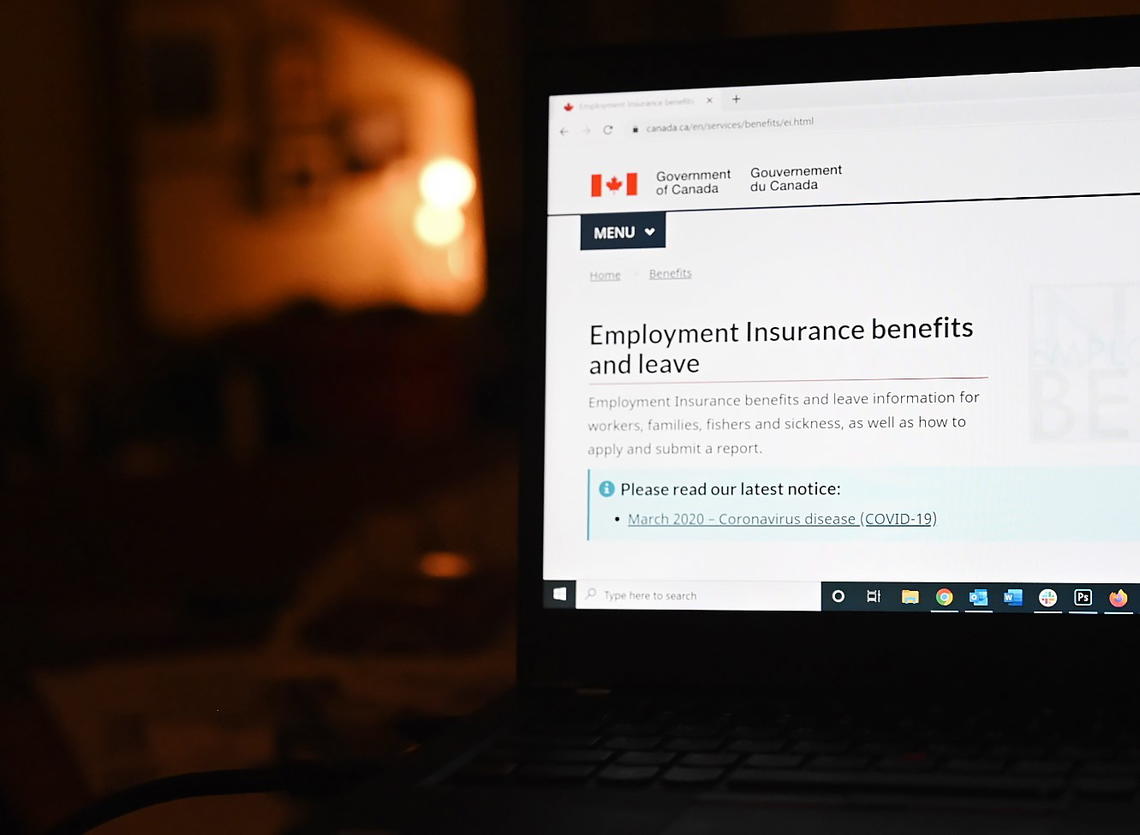
April 16, 2021
COVID-19 has been much harder on those who already had anxiety and financial issues
The COVID-19 pandemic has resulted in massive shifts to seemingly every aspect of daily life. At the heart of these changes have been requirements to socially distance from others and stay at home.
A number of businesses closed their doors or drastically cut back on hours and continue to do so. The result has been a historic economic recession in Canada. The drop in economic productivity has been unprecedented and millions of Canadians became unemployed after the first onset of lockdown measures.
- Co-authors of this article with Alex Bierman are Laura Upenieks, Baylor University, Paul Glavin, McMaster University, and Scott Schieman, University of Toronto
An Ottawa store sign in March 2020.
THE CANADIAN PRESS/Adrian Wyld
These economic changes have resulted in much greater financial stress for many Canadians than they had faced prior to the pandemic. The financial fallout of the pandemic often loomed larger than the health threat.
As Loretta, a 43-year-old clerical worker, told us as part of our research into the pandemic:
To me, the word ‘stress’ is really more financial than anything.… I was like, ‘Oh, I gotta really think about how I’m spending my money and where I can cut back.’ The stress for me wasn’t really COVID-specific in terms of illness, catching it, transmitting it.
Our recently published study suggests that financial stress during the first several months of pandemic was not the same for all Canadians.
Instead, Canadians who already had poor health and finances at the start of the pandemic were most at risk. In March 2020, shortly after the COVID-19 outbreak in Canada, we collaborated with the Angus Reid Forum to conduct a national survey of about 2,500 Canadian workers. We surveyed workers across a number of levels of education, fields of expertise and occupations so that our results are broadly representative of Canadian workers at the start of the pandemic.
We then re-interviewed these same people in April, May and June of 2020, including people who were laid off, temporarily furloughed or unemployed. Each time, we asked questions about common experiences of financial stress, such as whether they had enough money for bills or basic necessities. We then examined the factors in March that lead to risks of financial stress between April and June.
Poor finances harmed mental health
We found a consistent and concerning pattern: People with financial problems at the start of the pandemic were much more likely to experience financial stress throughout the next several months.
Another prominent factor was people’s health. People with frequent symptoms of anxiety and poor physical health were much more likely to experience financial stress across the first months of the pandemic.
We also found that financial stress had substantial effects on mental health. By June, people who consistently reported financial stress in the prior months had higher levels of psychological distress than people who did not report any financial stress.
Financial stress can have powerful effects on mental health by creating anxiety and uncertainty in people’s lives. Tom, a 36-year-old who works in sales, described his experience:
“I was literally sitting in my home, unable to find out whether or not I was going to have income in the following week … where the stress came from was that complete inability to financially plan.”
Economic divide
Our research highlights the growing economic divide during the COVID-19 pandemic. Canadians have been asked to sacrifice a lot in the name of slowing the spread of COVID-19. Careers have been irreparably harmed, and many families have shouldered additional child care and schooling burdens.
But the financial burdens of the pandemic were not shared equally by all Canadians. Instead, people who were already under economic pressure and dealing with health problems were more likely to experience a vicious cycle of economic hardship and worsened mental health.
Two lessons emerged from our research.

The employment insurance section of the Government of Canada website highlighting the CERB is shown on a laptop in Toronto in April 2020.
THE CANADIAN PRESS/Jesse Johnston
First, government leaders need to recognize that even with financial support like the Canada Emergency Response Benefit, known as CERB, many Canadians have fallen through the economic cracks.
The consequences for impaired mental health are clear and destructive. Much more needs to be done to provide financial support during the pandemic, or it is quite likely that vulnerable Canadians will continue to experience financial impairments and reduced mental health many years into the future, even as vaccination rates continue to rise.
Second, short-term interventions like CERB are likely inadequate for addressing systemic inequalities that deepened during the pandemic. While there is no simple solution to addressing economic inequality, Canadians will need to consider more extensive remedies, such as basic income support programs that ensure a sufficient standard of living.
Read more: How to build a better Canada after COVID-19: Transform CERB into a basic annual income program
The alternative is a probable increase in the number of Canadians who are shunted off from society and mired in despair due to a lack of financial resources.
Alex Bierman is an associate professor at the University of Calgary.





